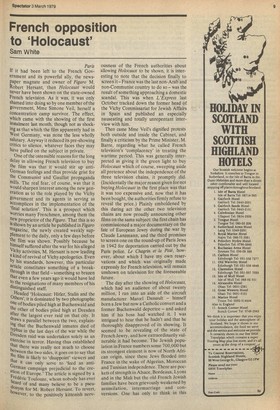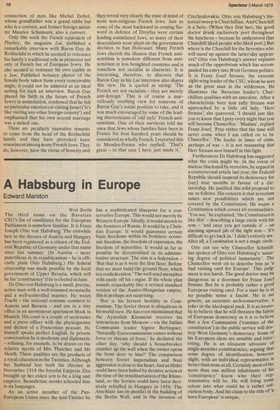French opposition to 'Holocaust'
Sam White
Paris If it had been left to the French Government and its powerful ally, the newspaper magnate and owner of Figaro M. Robert Hersant, then Holocaust would never have been shown on the state-owned French television. As it was, it was only shamed into doing so by one member of the government, Mme Simone Veil, herself a concentration camp survivor. The effect, Which came with the showing of the first instalment last month, though not as shocking as that which the film apparently had in West Germany, was none the less wholly salutary. Anyway it reduced its pre-showing critics to silence, whatever faces they may have pulled on the subject in private. One of the ostensible reasons for the long delay in allowing French television to buy the film was that it would stir up antiGerman feelings and thus provide grist for the Communist and Gaullist propaganda mills. The real fear, of course, was that it Would sharpen interest among the new generation as to the role played by the Vichy government and its agents in serving as accomplices in the implementation of the final solution'. This is a prospect which Worries many Frenchmen, among them the ew Proprietor of the Figaro. That this is so IS shown by an article he published in Figaro magazine, the newly created weekly supplement to the daily, only a few days before the film was shown. Possibly because he himself suffered after the war for his alleged Vichy activities, M. Hersant is now leading a kind of revival of Vichy apologetics. Even by his standards, however, this particular article constitutes something of a breakthrough in that field — something so brazen that even a few years ago it would have led to the resignations of many members of his distinguished staff.
Headed 'Holocaust: Hitler, Stalin and the Others', it is dominated by two photographs: one of bodies piled high at Buchenwald and the other of bodies piled high at Dresden after the largest ever raid on that city. It taws a parallel between the two, explaining that the Buchenwald inmates died of tYPhos in the last days of the war while the Dresden raid was undertaken solely as an exercise in terror. Having thus established that there was really not much to choose be, tvveen the two sides, it goes on to say that we film is likely to 'disappoint' viewers and that it can only serve to 'feed an antiGerman campaign prejudicial to the creation of Europe.' The article is signed by a Frederic Toulouze, whom nobody has ever heard of and many believe to be a pseudonym for M. Robert Hersant. To revert, "°wever, to the positively kittenish nerv ousness of the French authorities about allowing Holocaust to be shown, it is interesting to note that the decision finally to screen it—France was the last non-Arab and non-Communist country to do so — was the result of something approaching a domestic scandal. This was when L'Express last October tracked down the former head of the Vichy Commissariat for Jewish Affairs in Spain and published an especially nauseating and totally unrepentant interview with him.
Then came Mme Veil's dignified protests both outside and inside the Cabinet, and finally a criticism by the Prime Minister, M. Barre, regarding what he called French television's 'complacency' in treating the wartime period. This was generally interpreted as giving it the green light to buy Holocaust which of course, sweeping aside all pretence about the independence of the three television chains, it promptly did. (Incidentally the major reason given for not buying Holocaust in the first place was that it was too expensive and, now that it has been bought, the authorities firmly refuse to reveal the price.) Plainly emboldened by this daring act the other two television chains are now proudly announcing other films on the same subject: the first chain has commissioned a major documentary on the fate of European Jewry during the war by Claude Lanzmann, and the third promises to screen one on the round-up of Paris Jews in 1942 for deportation carried out by the Paris police. Le Chagrin et la Pint s, however, about which I have my own reservations and which was originally made expressly for French television, will remain unshown on television for the foreseeable future.
The day after the showing of Holocaust, which had an audience of about twenty million, I ran into an aide of the aircraft manufacturer Marcel Dassault — himself born a Jew but now a Catholic convert and a former Buchenwald deportee — and asked him if his boss had watched it. I was intrigued to hear that he hadn't and that he thoroughly disapproved of its showing. It seemed to be revealing of the state of French Jewry, and how extraordinarily vulnerable it had become. The Jewish population in France numbers some 700,000 but its strongest element is now of North African origin, since these Jews flooded into France in the wake of Algerian, Moroccan and Tunisian independence. There are pockets of strength in Alsace, Bordeaux, Lyons and in the Midi but the old French Jewish families have been grievously weakened by assimilation, intermarriage and conversions. One has only to think in this connection of men like Michel Debre, whose grandfather was a grand rabbi but who is a convert, and former foreign minister Maurice Schumann, also a convert.
Only this week the French equivalent of Playboy, the magazine Lui, published a remarkable interview with Baron Guy de Rothschild in which he seemed to renounce his family's traditional role as protector not only of French but of European Jewry. He also seemed to renounce his own quality as a Jew. Published between photos of the female body taken from every conceivable angle, it could not be admired as an ideal setting for such an interview. Baron Guy placed his faith in the future of French Jewry in assimilation, confessed that he felt no particular emotion on visiting Israel (It's like visiting any other foreign country') and emphasised that his own second marriage was a mixed one.
These are peculiarly insensitive remarks to come from the head of the Rothschild family and they have provoked keen resentment among many French Jews. They do, however, have the virtue of honesty and they reveal very clearly the state of mind of most non-religious French Jews. Just as some of the most backward in coming forward in defence of Dreyfus were certain leading assimilated Jews, so many of their descendants were silent on the government decision to ban Holocaust. Many French Jews cherish the illusion that French antisemitism is somehow different from antisemitism in less benighted countries and is somehow not racialist in character. It is interesting, therefore, to discover that Baron Guy in his Lui interview also shares this view. He is quoted as saying: The French are not racialists — they are merely anti-foreign.' This is of course a marvellously soothing view for someone of Baron Guy's social position to take, and it was much encouraged by some of the leading theoreticians of 'old style' French antisemitism. One of their survivors told me once that Jews whose families have been in France for four hundred years should be considered as wholly French. I reported this to Mendes-France who replied: 'That's great — in that case I have just made it.'



































 Previous page
Previous page